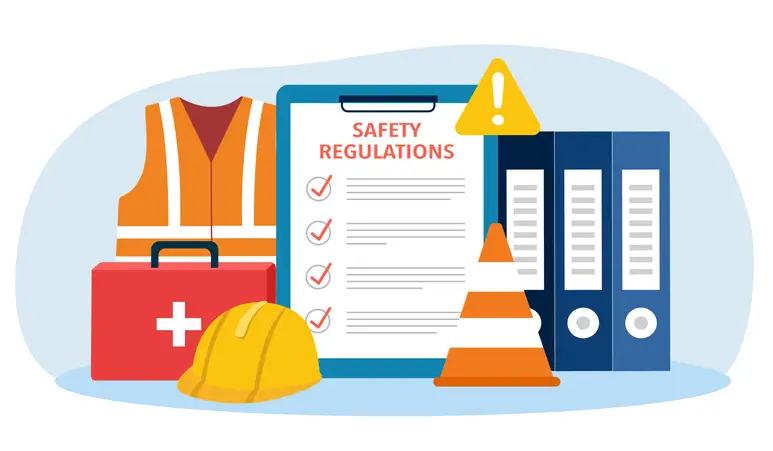What are the OSHA Standards for General Industry?
The Occupational Safety and Health Administration Act has been a cornerstone since 1970 in the realm of a safe working environment. This act generated the OSHA (Occupational Safety and Health Administration) to ensure security and to safeguard the employees by providing them with safe and healthy working conditions. OSHA prioritizes offering righteous education, effective training, and assistance to foster a healthy and secure working situation.
Created after the constant struggle for worker protection in the United States, OSHA has still been playing a vital role in safeguarding employee safety in all kinds of industries, including construction and general industry, by keeping our focus on General industries, including industries that are not classified as construction, maritime activities, or agriculture. OSHA general industry standards are specifically established to promote safety regulations in workplaces like laboratories or offices.
Overview of OSHA Standards for the General Industry
Understanding The Significance Of General Industry Standards And How They Contribute To Mitigating Workplace Hazards.

By getting the core knowledge about the framework of OSHA general industry standards and their practice implications, employees and others can foster a healthy environment that prioritizes a healthy state of employees. Firstly, exploring the training programs provided by OSHA to ensure workplace safety.
OSHA 10-Hour and 30-Hour Training Programs – Promoting a Healthy and Secure Environment:
These two outreach training programs serve as a comprehensive guide to tailor the employees working in the general industries to gain the proper training and education by prioritizing the safety of themselves and other workers. These 10-hour and 30-hour training courses cater to the employees playing the role of directors, supervisors, or foremen, offering them to mitigate workplace hazards effectively.

The OSHA-10-Hours general industry training program assists the employee in identifying the hazards and how to deal with them to maintain the safety of the working environment. Participants are provided with the certification card after completing the OSHA course pertinent to the General industry. This card indicates their proficiency in the OSHA standards and regulations.
Similarly, The OSHA 30-hour course is focused on providing the employee with more detailed and descriptive educational training about the General Industry OSHA standards and regulations to predict the Hazards in working situations. Through interactive sessions, participants are provided with training to control Work-related risks and job site hazards.
Both outreach training programs are available online 24/7 and cover the essential training and education necessary to mitigate risk. This includes fire preventatives, Safe and secure use of equipment, Awareness regarding chemical hazards, safety from MSD and RMD injuries, and other risks provoking unguarded equipment.
A Brief Overview of OSHA Standards in General Industry

Under the Department of Labor, the Occupational Safety and Health Administration has been established. The OSHA standards for general industry are codified in section 29 of Federal regulation. This is why, the general industry standards also called 29 CFR 1910 regulations. These legislative standards are suggested to be applied universally and across the District of Columbia. These standards address a wide range of topics to promote a safe and secure environment in which to work.
General Industry-Specific Standards:
OSHA prescribes the regulations and standards to tailor the specific general industry such as maritime or agriculture. Employers enrolled in these industries are trained to navigate the dual nature of the compliance framework, ensuring its adherence to the industry. They are provided with training in tasks including the ladder and stairways usages differently from other construction industry training.

OSHA Compliance Assistance Programs:
Compliance assistance in OSHA standards has been creating challenges related to the access to limited resources for small businesses, To address this issue OSHA has created a complimentary consultation program to empower small businesses to aid them in achieving compliance.

This service is provided especially to small businesses so that they can meet the obligations associated with obligations and identify the applicable OSHA general industry standards. Adherence to these Compliances is not a legal requirement but is considered a moral obligation to avoid the failure of the industry.
State-Specific Health Programs:
OSHA authorized the other states to enforce their safety healthy programs, currently 28 states are using the OSHA-approved safety training programs. However, the California Division of Occupational Safety and Health (Cal/OSHA), and Cal/OSHA standards for General Industry prioritize the strict imposition of OSHA standards especially related to chemical-related hazard protection.

In-Depth Exploration of OSHA’s Top 6 Safety Standards in General Industry Regulations
Following are the described OSHA requirements and safety standards for each employee working in the general industry to foster a safe and healthy working environment.

1. Hazard Communication:
The hazard communication standards in OSHA general industry regulation lie under 29 CFR 1910.1200, which assists the workers and provides them with the skills to communicate information about hazards related to chemicals. This standard also emphasized the importance of written hazard communication, to ensure that employees are aware of the potential risks of chemicals they are using in their daily work life and are assisted with training to protect themselves in necessary situations.
2. Effective Emergency Plan Standard:
The emergency action standard is codified as 29 CFR 1910.38 in OSHA general industry regulation. This aids the employers in developing an effective emergency action plan to safeguard themselves in emergencies like fire or other natural disasters. This standard is mandatory by OSHA, and this action plan includes the complete evacuation procedure, reporting on time, and coordination with other emergency services.
3. Fire Safety Standard:
This standard is essential as it promotes the safety of employees’ property and lives by mitigating fire-related risks and incidents. This standard lies under 29 CFR 1910.39, which promotes the general industry safety and OSHA standards by empowering the employee to develop strategic fire prevention plans and practices. These standards prioritize giving employees the right training to use fire extinguishers and other personal protective equipment, including oxygen masks. It is observed that more than 2000 violations are present in the standard related to respiratory protection.
4. Exit Routes During Emergencies:
OSHA has established a standard that provides guidelines about exit routes in emergencies to ensure the safe evacuation of workers. This standard is codified according to their specific requirement as 29 CFR 1910.34 (design), 29 CFR 1910.35 (construction), 29 CFR 1910.36(maintenance), and 29 CFR 1910.37(operation). These exit routes include the provision of clear and adequate pathways and the provision of enough capacity for employees to evacuate.
5. Machine Guarding Standard in the General Industry:
This standard emphasized the provision of one or more methods for machine guarding to foster the safety of the operator; these protective measures include the provision of barrier guards, two hand-tripping devices, and other electronic safety devices. Moreover, this standard is outlined in 29 CR 1910.212.
6. Medical and First Aid Provision:
This standard is detailed in 29 CFR 1910.151, which emphasizes providing instant medical care and first aid personnel to injured or needy employees to protect them. This provision of medical facilities depends solely upon the nature of the hazard, the situation, and the total number of employees. This standard includes training on how to use PPE effectively and ways to respond to health-related emergencies.
These OSHA standards and regulations are essential to promote the safe and healthy working environment in general industries. In 2022, OSHA did around 31,820 inspections, programmed and unprogrammed, and 55% of inspections were the results of employee complaints regarding their injuries and fatalities. On the other hand, around 44 percent of inspections were programmed to inspect the industries to see if they were following the generated OSHA regulations and to find the number of total violations.
Enhance Workplace Safety!
OSHA General Industry training provides essential aid to employees who are working in high-risk fields such as manufacturing or healthcare industries. Notably, OSHA is providing 10- and 30-hour general industry training programs to create a healthy and safe environment by prioritizing the well-being of employees. Thus, practices like hazard communication, training to use the gauges safely, predicting the risks, electrical safety, and other protective measures are provided by OSHA, indicating the importance of employees’ lives and the reputation of industries.




